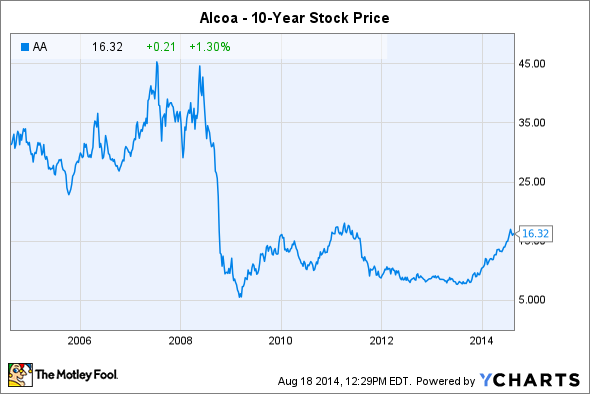
Aluminum-made aircraft have always been a huge part of Alcoa's business. Source: Alcoa.
The recession of 2008 hit the entire global economy hard, but Alcoa (AA) sustained some of the longest-lasting effects of the crisis of any company outside the financial industry. As demand for construction and infrastructure-related commodities tumbled, the aluminum giant had to deal with huge levels of oversupply in the industry and the resulting crash in metals prices. Then, even as most of the economy recovered sharply in the years following the crisis, Alcoa was slow to regain momentum. With the stock finally moving upward strongly over the past year, though, many investors have started to see Alcoa as a possible good-news story. Let's take a closer look at this company to see whether the stock deserves interest from investors right now.
Valuation: Getting ahead of fundamentals?
A decade ago, Alcoa took full advantage of the boom in commodities demand, capturing its fair share of customers seeking lightweight applications. Emerging markets provided much of the worldwide demand that Alcoa saw for aluminum products, and that led to solid results for the company, as well as to the rise of a competitive aluminum industry in China and elsewhere.
When the bottom fell out of the global economy, Alcoa felt the impact especially hard, and its Chinese competitors played a major role in holding the industry back in the years that followed. Alcoa attempted to use its history of innovation to its advantage, but the sheer size of China's production base combined with slowing GDP growth even in formerly fast-growing emerging market countries held back its efforts. Even as other areas of the economy recovered, Alcoa still had to deal with overcapacity in aluminum production that weighed on prices and kept its stock from enjoying gains similar to its industrial peers.
Fundamentally, Alcoa's most recent recovery reflects the hope that the company's new strategy will continue to produce earnings growth. Specifically, in order to deal with raw aluminum prices that remain at fairly low levels, Alcoa has worked hard to build a portfolio of tailor-made products that it can sell to its better customers. These value-added products include key components for the aerospace and automotive industries, as technological advances and the ongoing need for greater fuel efficiency have given potential Alcoa customers the incentive and the means to capture cost-saving competitive advantages against their own rivals. For now, though, the full extent of the earnings growth that investors are hoping for hasn't yet materialized; from that perspective, even a successful performance could leave the stock playing catch up in the short run.

Aluminum wheel. Source: Alcoa.
Cleaning up against the competition
Part of Alcoa's success has come from maintaining a long-term view of the aluminum industry's potential. On one hand, Alcoa has made many corporate decisions to rein in production, closing smelter facilities and temporarily shuttering other operations to do its part toward shrinking overall industry supply and putting a floor under aluminum prices. On the other hand, even as major competitors Rio Tinto (RIO 0.43%) and BHP Billiton (BHP 0.22%) have sought to sell off some aluminum assets -- largely unsuccessfully -- Alcoa has kept its eyes open for good long-term deals. Alcoa's willingness to make strategic acquisitions will serve it well when aluminum prices finally recover.
Alcoa has done well to make moves in line with its overall corporate strategy. The company's purchase of aerospace component producer Firth Rixson for $2.85 billion further accentuates Alcoa's commitment to the aircraft industry. With trillions of dollars' worth of potential new airplanes due to be built in the next 20 years, Alcoa's efforts to be the go-to provider of customized aluminum materials for aerospace have a huge potential to pay off. In addition, Alcoa has taken steps to ensure that other materials don't supplant aluminum, with a partnership with a Russian producer of titanium helping to diversify Alcoa's product base and helping give aerospace customers a single platform for all their needs.

Source: Alcoa.
Domestically, Alcoa towers above its peers in the industry. But nimble players such as Noranda Aluminum and Century Aluminum still pose a threat, as their smaller size could make them better able to adapt to changing circumstances more quickly.
Is Alcoa a good buy right now?
With the share price more than doubling in less than a year, it's hard to see today as a perfect time to buy Alcoa stock. Geopolitical and economic risks have grown more numerous in 2014, yet that hasn't stopped share prices from continuing to climb. Yet if Alcoa's plans come to fruition, then investors might well never get a better chance to buy the aluminum giant's stock. From that perspective, even a small pullback like the one we've seen over the past month is a potential buying opportunity for long-term investors.





